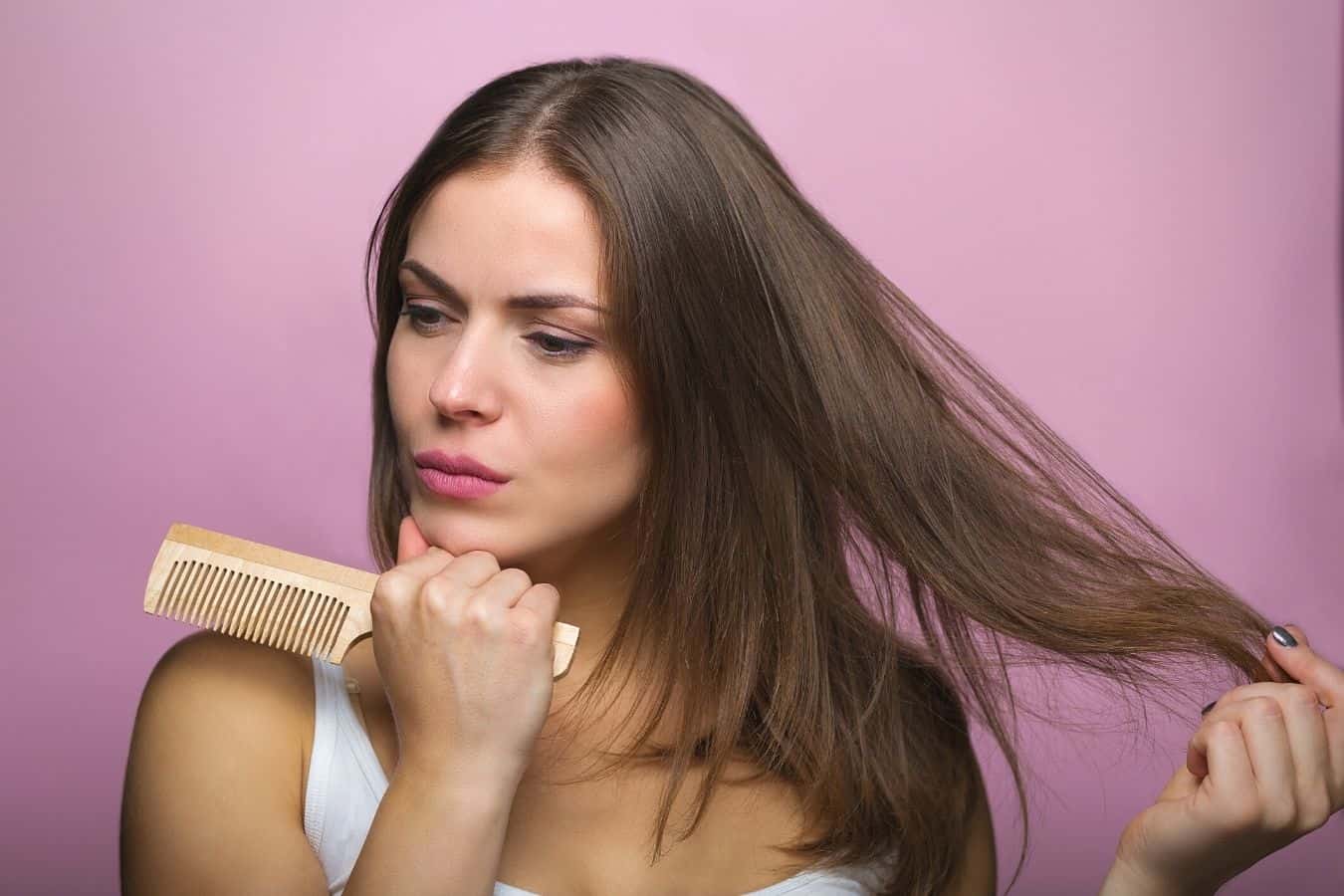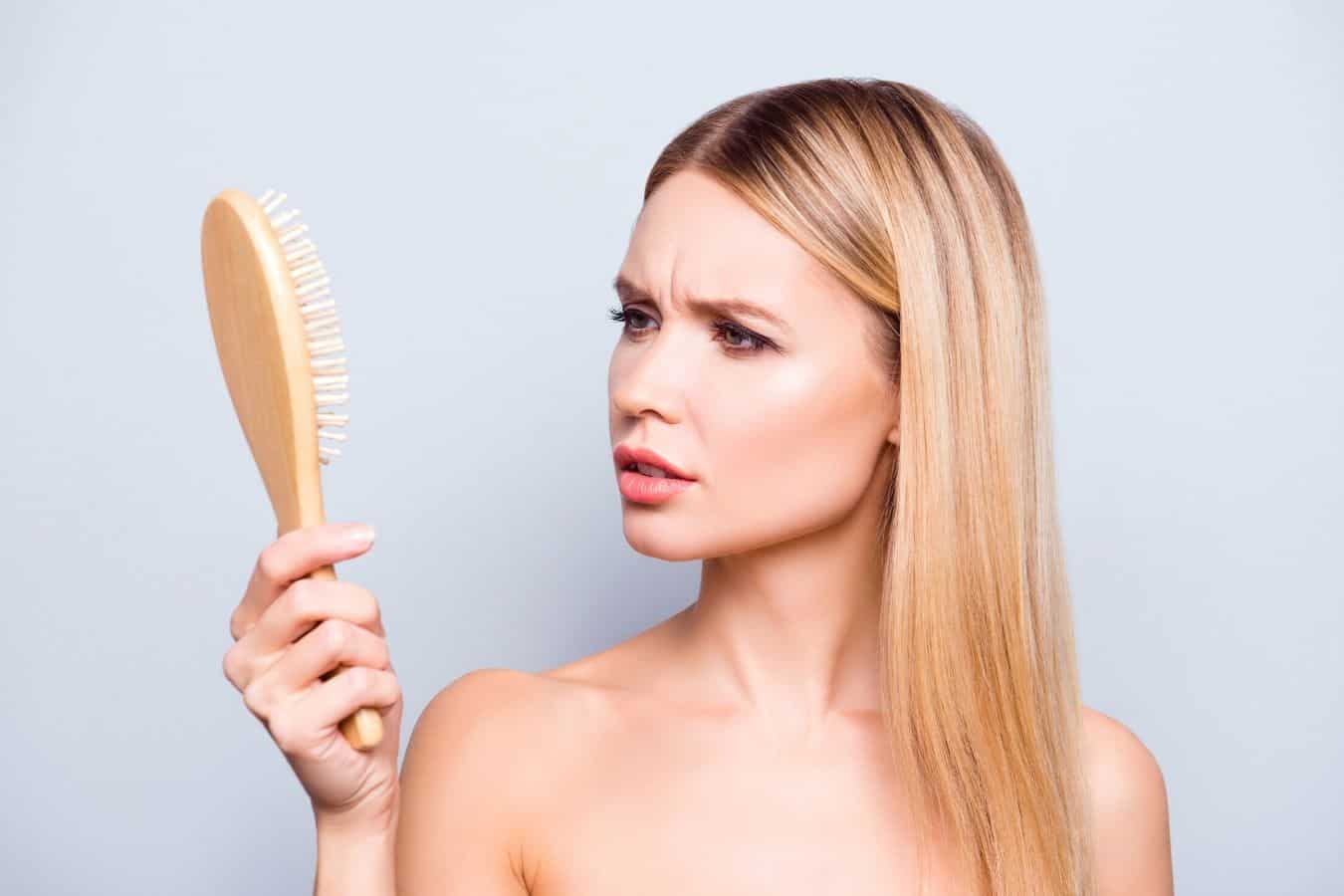We know that collagen is instrumental in the appearance of our skin, but collagen also has remarkable effects on hair. In this article, I outline the 7 most important benefits of collagen for hair.

What Is Collagen?
Collagen is the body’s primary protein. In fact, it makes up 25 – 35% of our total protein stores. It is the most significant building block for our skin, joints, muscles, and hair.
Collagen is made up of amino acids and supports our connective tissues. It is therefore also critical to the normal, healthy functioning of our bodies.
The primary benefits of collagen are:
- Increasing muscle mass
- Keeping bones healthy
- Relieving joint pain
- Reducing wrinkles and improving skin elasticity
Some reports also suggest collagen can help with weight loss and gut health but this has not been scientifically proven.
How Does The Body Make Collagen?
Our bodies will create collagen by breaking down the protein in our food. Foods like beans, nuts, and seeds are all great for collagen production, as are dairy, eggs, and meat.
After the age of 25, our collagen levels naturally reduce by around 1.5% per year.
That’s why collagen supplements are such a major player in the beauty world. They are easily consumed and help people to maintain the elasticity and strength of their joints, skin, and hair.
Plus, collagen supplements are often boosted with other vitamins and minerals like zinc and vitamins C, B12, and B6, giving you that extra goodness.
5 Reasons Why Collagen Is Good For Hair
1. Increased Elasticity, Volume, And Shine
Reduced collagen in the body means that your hair will likely become brittle and breakable. By supporting your body’s collagen levels, you’re therefore helping to avoid split ends and frizz.
Collagen also supports blood vessels, which in turn enables more nutrients to get into the hair’s strands and the scalp itself.
A greater amount of nutrients results in stronger, more moisturized hair with extra bounce and shine.
2. Moisturizes
Collagen supplements can also help rebuild the structure of the middle part of the skin called the dermis.
The dermis is the environment within the skin that surrounds the follicle. This middle layer of skin is vital for healthy blood flow and diffusion of nutrients to the hair follicle.
The better the blood flow, the more healthy and moisturized hair you’ll have.
3. Reduces Damage To Hair Follicles
Free radicals and damage from environmental sources can lead to hair thinning. They particularly attack hair follicles, which in turn impedes hair growth.
Collagen – particularly marine collagen – works to neutralize free radicals thanks to its powerful antioxidants.
4. May Reduce Hair Graying And Thinning Due To Age
Because collagen works to support your dermis, it will keep that layer of skin elastic and supple. In turn, this may reduce the hair thinning that people over a certain age experience.
Similarly, as hair ages, its melanin becomes more vulnerable to the attack of free radicals.
Less melanin means that your hair has less pigment, which can result in graying hair.
But the antioxidants in collagen may help to fight the impact of these free radicals, thereby supporting the normal production of melanin.
5. May Help With Hair Growth
Although studies on collagen and hair growth are still in the early stages, the results so far seem promising. For example, A study by Science reported that there is a correlation between hair loss and our natural collagen supplies.
This would indicate that the less collagen we have in our bodies, the likelier it is for hair loss to occur.
Remember, collagen contains essential amino acids that make up the protein keratin, which is an essential part of the hair structure.
The more keratin there is in the hair, the more there is available to support hair growth and minimize thinning.
Hair with more keratin will be healthier, stronger, and more elastic, as well as appear fuller and thicker.
That’s why hair care products are frequently fortified with collagen, keratin, or biotin (a B vitamin that also supports hair growth).
By using shampoo or conditioner with collagen alongside collagen supplements, you’re helping your hair to fortify itself and may minimize hair thinning or loss.
How Much Collagen Should You Use?
Always follow the manufacturer’s suggested dosage – consult with a doctor if you exceed this. Typically, a daily dose of 2.5 – 15 grams should be safe and effective.
Side Effects Of Using Collagen For Hair

Remember to always consult your doctor before taking collagen. If you’re using an external collagen product, always patch test before use.
If you do experience side effects of using collagen for your hair, it may be because you’re allergic to a derivative of that collagen.
Collagen supplements can be made from a variety of different sources, including animals, and marine creatures, but can also be vegan.
It’s best to double-check the ingredients of the collagen you’re consuming before you take any, so as to ensure you aren’t allergic.
At present, there’s also little research on the interaction between collagen supplements and medication.
What Is the Difference Between Collagen and Gelatin?

Gelatin is a substance created when collagen is significantly heated.
Like collagen, it’s composed of many amino acids. It, therefore, helps to maintain the health of your gut, joints, skin, and hair.
Gelatin is an animal-based substance, so those on a vegan or plant-based diet will want to avoid it.
These two substances have very similar nutritional profiles, but different applications.
Both are easy to digest, but it’s only collagen that’s used as a nutritional supplement – gelatin is mostly used as a gelling agent in cooking and baking.
References
Disclaimer: This site is not intended to provide professional or medical advice. All of the content on LovedByCurls.com is for informational purposes only. All advice should be followed at your own discretion. Ingredients may change at any time so always check the product label before using. Check our full disclaimer policy here.
